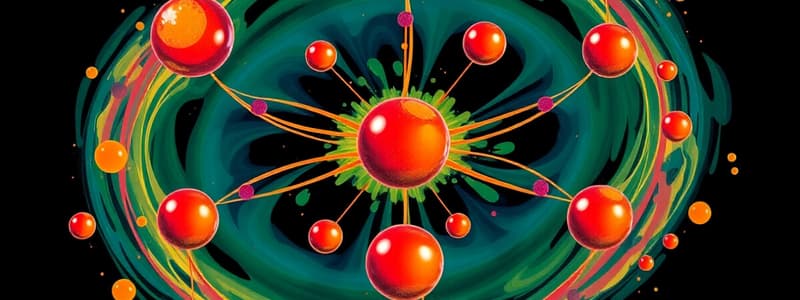Podcast
Questions and Answers
Which of the following states of matter has particles that are closely packed together in an ordered structure?
Which of the following states of matter has particles that are closely packed together in an ordered structure?
- Solid (correct)
- Plasma
- Gas
- Liquid
Gases have stronger intermolecular forces than liquids.
Gases have stronger intermolecular forces than liquids.
False (B)
Name one type of intermolecular force.
Name one type of intermolecular force.
Hydrogen bonding
In liquids, particles are more spaced out but still in contact with each other, compared to __________.
In liquids, particles are more spaced out but still in contact with each other, compared to __________.
Match the following types of intermolecular forces with their characteristics:
Match the following types of intermolecular forces with their characteristics:
Flashcards
Solid
Solid
The state of matter where particles are closely packed in a fixed, ordered structure. They have strong intermolecular forces and cannot flow freely.
Liquid
Liquid
The state of matter where particles are more spaced out than in solids but still in contact. They have weaker intermolecular forces than solids and can flow freely.
Gas
Gas
The state of matter where particles are far apart and have no fixed arrangement. They have the weakest intermolecular forces and can move freely.
Dispersion forces
Dispersion forces
Signup and view all the flashcards
Dipole-dipole forces
Dipole-dipole forces
Signup and view all the flashcards
Study Notes
Kinetic Molecular Theory of States of Matter
- Solids: Particles are closely packed in an ordered structure.
- Liquids: Particles are more spaced out than in solids but still in contact.
- Gases: Particles are widely dispersed and have weak interactions.
Intermolecular Forces
- Liquids experience stronger intermolecular forces than gases.
- Solids exhibit the strongest intermolecular forces.
- Types of intermolecular forces include:
- Hydrogen bonding
- Dipole-dipole forces
- Dispersion forces
- These forces affect properties such as:
- Boiling point
- Surface tension
- Viscosity
Studying That Suits You
Use AI to generate personalized quizzes and flashcards to suit your learning preferences.




